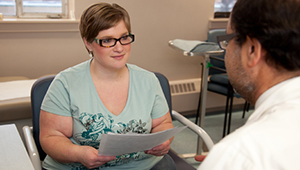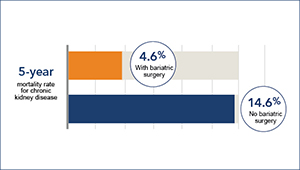Obesity
Research overview
“Obesity is the number-one health problem in the United States because it negatively affects our population’s health more than any other condition,” said Kaiser Permanente Washington Health Research Institute Senior Investigator David Arterburn, MD, MPH. Kaiser Permanente Washington researchers are doing practical research to learn how doctors, patients, families, employers, and policymakers can best work together to prevent and treat obesity.
“We’re focusing on three ways to halt the obesity epidemic,” said Senior Investigator Dori Rosenberg, PhD, MPH. “We’re helping to change obesity-promoting environments, bringing evidence-based prevention and treatment programs into health care systems, and helping people develop lifelong healthy diet and activity habits.”
Kaiser Permanente Washington obesity research areas include:
- reducing sedentary behavior and promoting physical activity and healthy diet in various age groups, populations with chronic conditions, and families;
- shared decision making to help patients find the best way to a healthy weight;
- implementing health coaches in primary care to support behavior changes;
- social networks that support lifestyle change programs;
- relationships between medications and genetic factors in developing obesity;
- health system, community, and national policies that address obesity;
- relationships between obesity and depression, diabetes, and other conditions; and
- long-term benefits and risks of bariatric (weight loss) surgery.
“Obesity is caused by many factors, so at Kaiser Permanente Washington, we’re working on many levels,” said Paula Lozano, MD, MPH, a senior investigator and Kaiser Permanente Washington’s assistant medical director for preventive care. “We’re improving health care to help people who are obese now. But since obesity is a societal problem, we’re also studying how to change our homes and workplaces and neighborhoods to create more healthy environments.”
Recent publications on Obesity
McTigue K, Courcoulas A, Wellman R, Tavakkoli A, Eavey J, Klawson E, Anau J, Garcia R, Stilwell D, Ahmed B, Fischer GS, Maier J, Paul K, Handley M, Saurabh S, Daigle C, Elwyn G, Arterburn D Exploring patient perspectives on shared decision making about bariatric surgery in two healthcare systems 2024 Dec;10(6):e779. doi: 10.1002/osp4.779. Epub 2024-11-26. PubMed
Smith VA, Zepel L, Kawatkar AA, Arterburn DE, Baecker A, Theis MK, Sloan C, Clark AG, Saurabh S, Coleman KJ, Maciejewski ML Health Expenditures After Bariatric Surgery: A Retrospective Cohort Study 2024 Dec;280(6):e8-e16. doi: 10.1097/SLA.0000000000006333. Epub 2024-05-10. PubMed
Lundholm MD, Kirschling S, Hu B, Aminian A, Arterburn DE, Courcoulas AP, Cummings DE, Gourash WF, Patti ME, Schauer PR, Simonson DC, Vernon AH, Kirwan JP, Kashyap SR Long-term outcomes of metabolic surgery versus medical/lifestyle therapy on metabolic dysfunction-associated fatty liver disease in adults with obesity and type 2 diabetes 2024 Dec doi: 10.1111/dom.15932. Epub 2024-09-12. PubMed
Richey M, Maciejewski ML, Zepel L, Arterburn D, Kawatkar A, Sloan CE, Smith VA A comparison of time-varying propensity score vs sequential stratification approaches to longitudinal matching with a time-varying treatment 2024 Nov 13;24(1):280. doi: 10.1186/s12874-024-02391-3. Epub 2024-11-13. PubMed
Clennin M, Reifler L, Goodman O, Brown MC, Vupputuri S, Daugherty SL, Schootman M Association of Housing Instability with Obesity Status Among Insured Adults 2024 Sep;67(3):417-422. doi: 10.1016/j.amepre.2024.04.008. Epub 2024-04-20. PubMed
Researchers in Obesity
 David E. Arterburn, MD, MPHSenior Investigator |
 Allen Cheadle, PhDSenior Investigator, KPWHRI; Senior Research Associate, CCHE |
 Andrea J. Cook, PhDSenior Biostatistics Investigator |
 Maricela Cruz, PhDAssociate Biostatistics Investigator |
 Nicole M. Gatto, PhD, MPHPrincipal Collaborative Scientist |
 Beverly B. Green, MD, MPHSenior Investigator |
 Mikael Anne Greenwood-Hickman, MPHSenior Collaborative Scientist |
 Paula Lozano, MD, MPHSenior Investigator; Director, ACT Center |
 Dori E. Rosenberg, PhD, MPHSenior Investigator |
 Gregory E. Simon, MD, MPHSenior Investigator |











